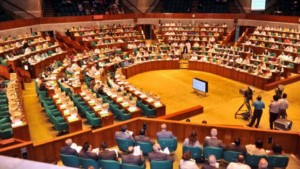Speakers at a programme on Thursday described the government’s budgetary move of corporate tax cut disappointing as it applies for banks and financial institutions only and not for all.
During a discussion programme on ‘Budget 2018-19: Views of the Business Community’ held under the joint aegis of Metropolitan Chamber of Commerce and Industry (MCCI) and Policy Research Institute (PRI), the speakers also opined that achieving a 30 percent higher revenue generation target will be a major challenge.
While presiding over the programme, MCCI President Nihad Kabir said, there are 353 publicly listed companies among which 101 companies of banking, financial institutions and insurance sector are entitled to the lower tax provision as proposed in the budget.
More than 150 publicly enlisted companies are not entitled to this proposed tax cut, she noted.
Mentioning increased revenue target a major challenge, the MCCI president suggested exploring new avenues of tax collection instead of putting further tax burden on the compliant enterprises.
Government also has taken some special measures, such as one stop service, economic zones for investors and exporters in the budget for improving the ease of doing business and encouraging investment. But the benefits of these measures will only be felt if they are implemented in a timely and effective manner, she opined.
Speaking as the chief guest, National Board of Revenue (NBR) Chairman Md Mosharraf Hossain said, reducing corporate tax for all will affect the national revenue.
The reason behind reducing corporate tax for the banking sector is to pressurize them to reduce their lending rate, explained the NBR chairman.
He also said, for strong implementation of Value Added Tax (VAT) law for revenue collection, electronic funds transfer (EFT) devices will be made compulsory within one year so that government receives the VAT paid properly by the consumers.
While sharing his observation on the proposed budget, PRI Chairman Dr Zaidi Sattar said, there are four statements in the budget speech that encapsulate trade policy — to keep the prices of essential goods unchanged, to provide necessary protection to domestic industries, to expedite expansion of exports and their diversification and to rationalize the tariff structure by reducing prevailing anomalies.
According to PRI research, Bangladeshi consumers pay prices roughly 50 to 100 percent above international prices for most manufactured consumer goods. Leaving these prices unchanged means leaving the price level significantly higher than the price level in comparator countries making Bangladesh appear to be a rather expensive place for middle class consumers, he said.
Dr Sattar also added that protective tariffs on import substitute production are indirect subsidies as they help raise the price of import substitutes in the domestic market.
“The budget should have at least recognized the imbalance of incentives between exports and domestic sales”, he said.
Dr Ahsan H Mansur, Executive Director of PRI, presented a key note presentation on ‘Budget FY19: Macroeconomic Setting, Lessons from FY18 Budget Execution and Implementation Challenges’. He said, the shortfall in private investment or GDP ratio gives rise to the concern about sustainability of the 7 per cent plus growth rate in the coming years.
During the programme representatives from the public and private sectors, eminent scholars, and policy experts were also present.




